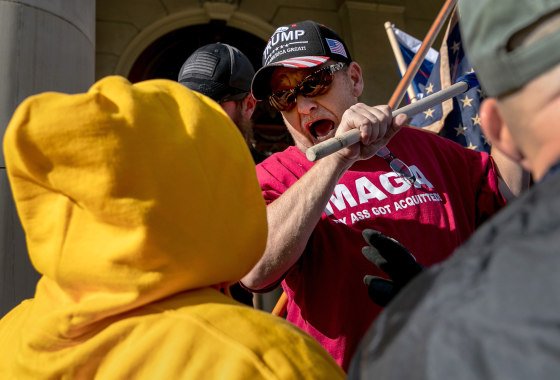Something "tribal" is happening in Washington, D.C. At least, this seems to be the consensus among (mostly) white and (mostly) progressive thought leaders and members of the media ever since the dawn of the Trump presidency.
The word "tribe" has come to evoke images of a primitive, mindless allegiance that "makes thinking unnecessary."
Take this February critique of Republican partisanship, or this one, from 2018. The word "tribe" has come to evoke images of a primitive, mindless allegiance that "makes thinking unnecessary." But, in the United States of America, a country that has endured its fair share of proud boys, clans and white nationalist organizations, why exactly are tribes being used to represent political incivility? What does it mean that one of the most damning criticisms of the Republican Party seems to be to liken it to Indigenous, brown and Black peoples around the world who have been historicized and erased throughout history?
Well, sorry to throw a wrench into the catchy alliterative tag line of the "tribal" Trump era, but those of us who descend from tribal lineages are tired of our history's being repurposed for a political game of chess. While there is a necessary critique to be made about the partisanship of U.S. politics, it should not be made at the expense of Indigenous people. And when mostly white pundits use the word to describe the tiresome game of follow the leader that American partisans are engaged in, they (re)enact the colonial simplification of our indigenous ethnopolitical systems by turning culture into cultish shorthand.
As we have seen argued over and over in the past decade, words matter. When Washington, D.C., changed the name of its pro football team, that mattered. And while it may seem like semantics, using "tribal" to describe a specific flavor of unthinking partisan ignorance matters, too. The etymology of "tribe" stretches back to ancient Rome, but it became more closely aligned with Eurocentric stereotypes during colonialism. To this day, "tribe" is controversial as a way to identify nations and groups of Indigenous peoples. Nevertheless, the geographical and sociopolitical groupings that history has called tribes still exist as systems of culturally nuanced governance and means of self-identification for indigenous peoples around the world and particularly in the United States of America. To use this word in a derogatory sense is, at best, willfully insensitive.
I write this as the daughter of the Yoruba people of western Africa and the Batswana people of southern Africa. However, as a Black American, I am well aware that most Black people in this country have been stripped of this intimate knowledge of their families' tribal belonging. Having said that, I cannot and do not take our heritage lightly. I am the product of a wealth of Indigenous knowledge — the same "tribal" systems that shaped the minds of world leaders such as Nelson Rolihlahla Mandela, rightful chief of the Madiba people — I take issue with diminishing that knowledge by comparing it to the apathy and cowardice of hyperpartisan politics.
As a Black American, I am well aware that most Black people in this country have been stripped of this intimate knowledge of their families' tribal belonging.
I can only imagine what this must feel like for the Indigenous peoples of this land that we inhabit — the cruel irony as we lament politicians' inability to condemn the glaring immorality of the invasion of the U.S. Capitol, using the same words once used to describe the native peoples of this land as they themselves were invaded.
Despite forced removal, massacres,residential schools made to "kill the Indian" but "save the man" — all physical, spiritual and mental attempts to eradicate their sovereignty and identity — Indigenous Americans have still retained and grown their intricate systems of "tribal" law, "tribal" nationhood and "tribal" identity.
But how can we know this history and still use the word so loosely and ineptly?
And why would anyone use a word that is so loaded — so tied to the original sin of this country — with no reference or thought to the legacy that is being evoked?
Perhaps it's easier to pretend that this word is politically neutral than to use words that would force us to confront what political extremism in America actually looks and sounds like.
Whatever the reasoning is, I invite you to consider who is being prioritized and what legacies are being serviced by such phrasing. As we've all come to learn in these past few years, it costs nothing to be mindful, to think about the implications of your words, or to simply listen.
And in the future, if you really need a zinger to capture the degenerative nature of these politics, one that can be tied to an actual history of deceit, violent collectivism and bigotry, maybe you should stop calling it tribalism and start calling it clannism.

